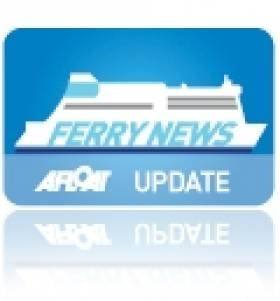Displaying items by tag: New Dublin Route Ferry
Stena’s New Dublin-Holyhead ‘Superfast’ Ferry On Delivery Voyage
#StenaSuperfast – Stena Line's latest flagship, Stena Superfast X which is to make her debut on the Dublin-Holyhead route next month is on her delivery voyage to the Irish Sea, writes Jehan Ashmore.
According to her master, Captain Richard Davies said "It is great to be back at sea and looking forward to bringing this magnificent vessel to her new home on the Irish Sea."
The 30,000 tonnes newcomer is currently off Scotland's west coast having sailed across the North Sea and passed offshore of John O'Groats at teatime yesterday. She had departed from Gdynia, Poland after an extensive refit to enhance levels of facilities for her 1,200 passengers.
Introduction of Superfast X will raise the bar on the core Irish Sea route also operated by close rivals Irish Ferries with the Ulysses, Epsilon and fast-ferry Jonathan Swift.
Stena Superfast X is to make her first call to her new homeport of Holyhead and is understood to be tomorrow around dawn. At a later stage she will visit Dublin Port for further berthing trials before entering service alongside Stena Adventurer.
The decision by Stena to concentrate all operations in Dublin Port follows the company's announcement earlier this month to axe the loss making Dun Laoghaire-Holyhead route. The historic link had been served by the Stena HSS high speed sea-service craft, Stena Explorer which began service in 1995.
The debut of Superfast X on the Dublin route will see the ferry boast 10 decks. Among the fitted-out facilities on her passenger decks are a premium lounge, several dining options, a cinema and in the family lounge, X-Box stations for entertainment.
She also has almost 2 kilometres of lane space for vehicles and freight traffic on the core central corridor route. Freight drivers will have their own dedicated lounge.
The newcomer follows a pair of Superfast sisters VII and VIII which also transformed services when Stena launched in 2011 a new route between Belfast and Cairnryan.





























































